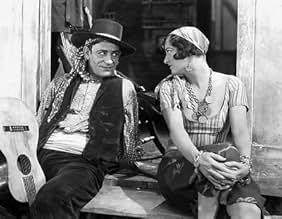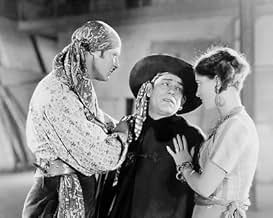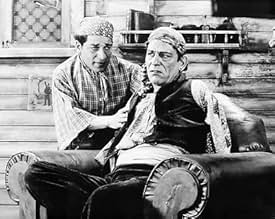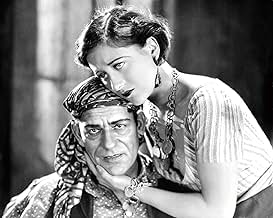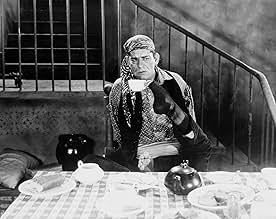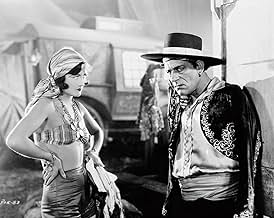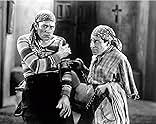NOTE IMDb
7,7/10
9,7 k
MA NOTE
Un criminel en cavale se cache dans un cirque et tente de posséder la fille de Monsieur Loyal quel que soit le prix à payer.Un criminel en cavale se cache dans un cirque et tente de posséder la fille de Monsieur Loyal quel que soit le prix à payer.Un criminel en cavale se cache dans un cirque et tente de posséder la fille de Monsieur Loyal quel que soit le prix à payer.
- Récompenses
- 2 victoires et 2 nominations au total
Tom Amandares
- Gypsy running to Zanzis Death Scene
- (non crédité)
Margaret Bert
- Fortune Teller
- (non crédité)
Louise Emmons
- Gypsy Woman
- (non crédité)
Italia Frandi
- Girl in Audience Flirting with Malabar
- (non crédité)
Venezia Frandi
- Woman in Audience
- (non crédité)
Polly Moran
- Landlady
- (non crédité)
- …
Julian Rivero
- Man in Theatre Audience
- (non crédité)
Billy Seay
- The Little Wolf
- (non crédité)
Dorothy Seay
- Spectator
- (non crédité)
John St. Polis
- Surgeon
- (non crédité)
Histoire
Le saviez-vous
- AnecdotesJoan Crawford always considered "L'inconnu (1927)" a big turning point for her. She said it wasn't until working with Lon Chaney in this film that she learned the difference between standing in front of a camera and acting in front of a camera. She said that was all due to Chaney and his intense concentration, and after that experience she said she worked much harder to become a better actress.
Chaney's performance certainly inspired co-star Crawford who wrote "Lon Chaney was my introduction to acting. The concentration, the complete absorption he gave to his characterization filled me with such awe I could scarcely speak to him...watching him have me the desire to be a real actress."
- GaffesMalabar pushes himself up off the bureau multiple times when talking to Nanon about flowers.
- Citations
Malabar the Mighty, Circus Strongman: There is a time for fear, Nanon... and a time for hate... and a time for love.
- Versions alternativesThe Turner library print has a commissioned score by the Alloy Orchestra and runs 49 minutes.
- ConnexionsFeatured in Universal Horror (1998)
Commentaire à la une
Tod Browning is one of the great mysteries of film history. His life story is filled with contradictions (some he created himself). No one argues the fact that he was the architect of the classic American horror film Dracula (1931), with Bela Lugosi as Dracula. His success is one that is grounded in his macabre but decidedly non-supernatural silent works. Beyond that the story gets cloudy. The "official" line is that he went on to make Freaks (1932) and the results were so horrific that it virtually destroyed his career, making the studio keep a tight rein on his subsequent genre efforts.
At the top of the list for strangeness is The Unknown (1927), one of the great silent films of all time. It was also one of the most offbeat psychological dramas ever produced by a major studio, especially one such as MGM. The collaboration between director/writer Tod Browning, himself a one time circus performer, and the intense performance by Lon Chaney, was a thing of magic.
The focus of the story is Alonzo (Lon Chaney) is an armless knife-thrower in a gypsy circus, known as "Alonzo, The Armless Wonder." He's really not armless, but has his arms strapped to his sides to appear limbless since he wishes to hide his identity from the cops. He's a career criminal on the run who with his cohort Cojo (John George), and continues to commit robberies while touring with the circus. Cojo is the only one who knows his secret and is the only friend he has. Alonzo is able to fling the knives with the toes of his feet, and his assistant Nano (Joan Crawford) is the target. She's the beautiful daughter of the circus owner and ringmaster, Zanzi (Nick de Ruiz).
Alonzo has become obsessed with Nano, and would do anything in the world for her love. He would also, he tells Cojo, do anything he could to someone who takes her away from him. Nano has a bit of a psychological problem, she can't stand any man who puts their arms around her or who tries to touch her. She feels very safe with Alonzo and they develop an affectionate bond of friendship, where she feels good hugging him. The circus strongman Malabar (Kerry) also compulsively loves her and won't take no for an answer, but he keeps putting his arms around her as she pushes him away.
Zanzi doesn't trust Alonzo and when he sees his daughter alone with him again, his anger builds because he feels he is putting "ideas" in his daughter's head. In a fit of rage he beats Alonzo with a whip until Malabar puts a stop to it and receives the thanks of Alonzo. But one evening Zanzi again confronts Alonzo, this time in the dark shadows nearby Nano's wagon and he notices that Alonzo has arms. This causes Alonzo to strangle him to death, but Nano could only see that the strangler had two thumbs on one hand.
Realizing that he can't marry her if he has arms, Alonzo decides to have them cut off. Alonzo blackmails a doctor (Lanning) into doing the procedure. But when he returns to see Nano, she tells him that she overcame her fear of having a man put her arms around her and will marry Malabar. The scene in this film when he realizes that he's cut off his arms for nothing is one of the most emotional in all of silent film (perhaps all of film), and it consists mostly of a closeup of his face as the horrible irony registers. Chaney's performance, and maybe our instinctive support of the underdog, has the odd effect of making you hope that he wins in the end, even though he's a murderer and he plots to have Malabar's arms ripped from his body by horses.
We get a glimpse of the pain that Chaney must have felt with his arms strapped to his chest day after day on the set. Mirroring that is a scene when he distractedly lights a cigarette with his feet, an intricate process that was aided by Peter Dismuki, a real armless man who served as a stunt double for many of Chaney's actions. Cojo (John George), Alonzo's dwarf assistant, looks on with growing mirth until he bursts out, reminding Alonzo that his arms aren't bound.
In the late silent period, filmmakers were advancing their art at an astonishing pace. Over at Fox, F.W. Murnau was making the most elegant of all silent films, Sunrise: A Song of Two Humans, which seemingly liberated the camera from gravity and demonstrated breathtaking in-camera optical effects. Browning and cinematographer Merritt B. Gerstad were not so precocious, but their experiments with filters and camera placement are nearly as intriguing. In a beautifully composed scene, Nanon grieves over her father's death and struggles between her love for the strongman Malabar and her fear of his hands; Malabar enters the room and confesses his undying love for her and his willingness to wait until her fear subsides. The shots are filmed through a heavy gauze that gives the entire composition the look of an oil painting with visible brushwork; it adds a softness and an intimacy that's similar to the effect later directors desired when they used soft-focus closeups of smiling women's faces, but there's nothing silly about its use here.
With that being said, Lon Chaney always played wild, scary and intriguing roles that garnered our pity and our sympathies no matter how horrifying they were. Part of the reason is because Chaney could play the agony of unrequited love like nobody else. His ability to lose the girl, when the movie hero would usually win her, was remarkably heartbreaking. This is just one reason why Chaney made an indelible impression on the history of cinema. The other was that he had a creepy presence on screen even when he played the good guy.
At the top of the list for strangeness is The Unknown (1927), one of the great silent films of all time. It was also one of the most offbeat psychological dramas ever produced by a major studio, especially one such as MGM. The collaboration between director/writer Tod Browning, himself a one time circus performer, and the intense performance by Lon Chaney, was a thing of magic.
The focus of the story is Alonzo (Lon Chaney) is an armless knife-thrower in a gypsy circus, known as "Alonzo, The Armless Wonder." He's really not armless, but has his arms strapped to his sides to appear limbless since he wishes to hide his identity from the cops. He's a career criminal on the run who with his cohort Cojo (John George), and continues to commit robberies while touring with the circus. Cojo is the only one who knows his secret and is the only friend he has. Alonzo is able to fling the knives with the toes of his feet, and his assistant Nano (Joan Crawford) is the target. She's the beautiful daughter of the circus owner and ringmaster, Zanzi (Nick de Ruiz).
Alonzo has become obsessed with Nano, and would do anything in the world for her love. He would also, he tells Cojo, do anything he could to someone who takes her away from him. Nano has a bit of a psychological problem, she can't stand any man who puts their arms around her or who tries to touch her. She feels very safe with Alonzo and they develop an affectionate bond of friendship, where she feels good hugging him. The circus strongman Malabar (Kerry) also compulsively loves her and won't take no for an answer, but he keeps putting his arms around her as she pushes him away.
Zanzi doesn't trust Alonzo and when he sees his daughter alone with him again, his anger builds because he feels he is putting "ideas" in his daughter's head. In a fit of rage he beats Alonzo with a whip until Malabar puts a stop to it and receives the thanks of Alonzo. But one evening Zanzi again confronts Alonzo, this time in the dark shadows nearby Nano's wagon and he notices that Alonzo has arms. This causes Alonzo to strangle him to death, but Nano could only see that the strangler had two thumbs on one hand.
Realizing that he can't marry her if he has arms, Alonzo decides to have them cut off. Alonzo blackmails a doctor (Lanning) into doing the procedure. But when he returns to see Nano, she tells him that she overcame her fear of having a man put her arms around her and will marry Malabar. The scene in this film when he realizes that he's cut off his arms for nothing is one of the most emotional in all of silent film (perhaps all of film), and it consists mostly of a closeup of his face as the horrible irony registers. Chaney's performance, and maybe our instinctive support of the underdog, has the odd effect of making you hope that he wins in the end, even though he's a murderer and he plots to have Malabar's arms ripped from his body by horses.
We get a glimpse of the pain that Chaney must have felt with his arms strapped to his chest day after day on the set. Mirroring that is a scene when he distractedly lights a cigarette with his feet, an intricate process that was aided by Peter Dismuki, a real armless man who served as a stunt double for many of Chaney's actions. Cojo (John George), Alonzo's dwarf assistant, looks on with growing mirth until he bursts out, reminding Alonzo that his arms aren't bound.
In the late silent period, filmmakers were advancing their art at an astonishing pace. Over at Fox, F.W. Murnau was making the most elegant of all silent films, Sunrise: A Song of Two Humans, which seemingly liberated the camera from gravity and demonstrated breathtaking in-camera optical effects. Browning and cinematographer Merritt B. Gerstad were not so precocious, but their experiments with filters and camera placement are nearly as intriguing. In a beautifully composed scene, Nanon grieves over her father's death and struggles between her love for the strongman Malabar and her fear of his hands; Malabar enters the room and confesses his undying love for her and his willingness to wait until her fear subsides. The shots are filmed through a heavy gauze that gives the entire composition the look of an oil painting with visible brushwork; it adds a softness and an intimacy that's similar to the effect later directors desired when they used soft-focus closeups of smiling women's faces, but there's nothing silly about its use here.
With that being said, Lon Chaney always played wild, scary and intriguing roles that garnered our pity and our sympathies no matter how horrifying they were. Part of the reason is because Chaney could play the agony of unrequited love like nobody else. His ability to lose the girl, when the movie hero would usually win her, was remarkably heartbreaking. This is just one reason why Chaney made an indelible impression on the history of cinema. The other was that he had a creepy presence on screen even when he played the good guy.
Meilleurs choix
Connectez-vous pour évaluer et suivre la liste de favoris afin de recevoir des recommandations personnalisées
- How long is The Unknown?Alimenté par Alexa
Détails
Box-office
- Budget
- 217 000 $US (estimé)
- Montant brut mondial
- 4 841 $US
- Durée1 heure 8 minutes
- Couleur
- Mixage
- Rapport de forme
- 1.33 : 1
Contribuer à cette page
Suggérer une modification ou ajouter du contenu manquant


